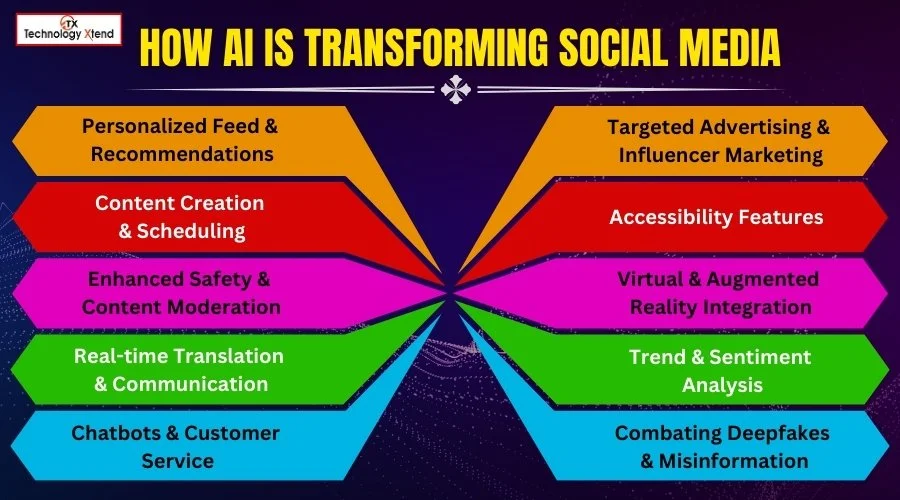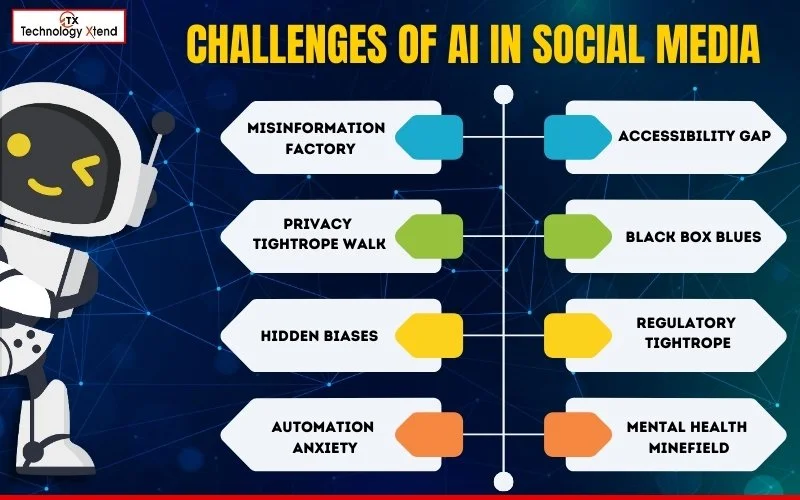
Technology XtendRole of AI in Revolutionizing Social Media
Discover how AI is transforming social media as we know it, from chatbots that converse to personalized content tailored just for you.
Social media has become a dominant force in our lives, and it's changing rapidly. Even just a few years ago, social media was primarily a tool for communicating with friends and staying up to date on current events. Today, social media platforms are increasingly powered by artificial intelligence (AI), which is revolutionizing the way we interact with them. From chatbots to personalized content, here are 10 ways AI is changing social media forever.
"AI is the catalyst revolutionizing social media, empowering businesses to create personalized content and engage with customers like never before.”
Chatbots
In recent years, chatbots have become increasingly common on social media platforms. These AI-powered bots are designed to interact with users, answer questions, and offer customer service. Chatbots can be programmed to handle a wide range of tasks, from helping users navigate a platform to answering frequently asked questions. One popular example of a chatbot on social media is Facebook's Messenger Bot, which can help businesses automate customer service and sales.
Emerging Trends in Chatbots:
- More sophisticated NLP: Recent advancements in Natural Language Processing (NLP) allow chatbots to understand complex user queries and respond in a more natural and human-like way. This makes interactions more engaging and reduces frustration.
- Omnichannel presence: Chatbots are no longer confined to social media. They're expanding to websites, messaging apps, and even voice assistants, creating a seamless user experience across platforms.
- Personalization and emotional intelligence: Newer chatbots leverage sentiment analysis and user data to personalize responses and adapt their tone based on the user's emotions. This fosters a more empathetic and engaging interaction.
- Integration with AI assistants: We're seeing collaborations between chatbots and AI assistants like Siri or Alexa, enabling hands-free interactions and access to wider information sources.
Also Read - How To Optimize Your Social Media Accounts
Content Curation
AI is helping social media platforms curate personalized content for users. Platforms like Twitter and Facebook use AI algorithms to identify the most relevant content for each user, based on their previous activity, demographics, and other factors. This has led to a more tailored, engaging experience for users, as they're able to see content that they're more likely to engage with. For marketers, it's also a powerful tool for reaching their ideal audience.
Benefits of AI-powered content curation:
- Personalization: As you mentioned, users receive content tailored to their interests, creating a more engaging and relevant experience. This can lead to increased user satisfaction and reduced churn.
- Improved discovery: AI algorithms can surface content that users might not have found themselves, exposing them to new ideas and perspectives, especially valuable for niche interests.
- Efficiency for both users and platforms: AI helps eliminate information overload by sorting through the vast amount of content and presenting only the most relevant pieces, saving users time and platforms resources.
- Targeted marketing: Marketers can leverage AI to reach their ideal audience with laser precision, leading to more effective campaigns and higher ROI.

Predictive Analytics
Another way AI is revolutionizing social media is through predictive analytics. AI algorithms can analyze user behavior and trends to predict what users are likely to do next. This can help marketers tailor their campaigns to reach their target audience with greater accuracy. For example, predictive analytics can be used to identify and reach potential customers who are likely to convert.
Applications of predictive analytics in social media:
- Marketing and advertising: Precise audience targeting, optimizing campaign performance, predicting customer churn, and identifying influencers.
- Customer service: Proactive issue identification and resolution, predicting customer needs, and personalizing support interactions.
- Content creation and strategy: Identifying trending topics, predicting content engagement, and tailoring content to specific user segments.
- Community management: Identifying potential risks and opportunities, analysing sentiment, and predicting virality of content.
- Social listening and reputation management: Understanding brand perception, identifying potential crises, and measuring the effectiveness of communication efforts.
Image and Video Recognition
AI-powered image and video recognition technology is helping social media platforms identify and remove inappropriate content faster and more accurately than ever before. For example, Facebook uses AI to identify and remove content that violates their community standards, such as hate speech and graphic violence. This technology has been crucial in helping social media platforms maintain a safe and welcoming environment for users.
Benefits of AI-powered image and video recognition:
- Faster and more accurate content moderation: AI algorithms can analyze vast amounts of images and videos in real-time, identifying potential violations much faster than human moderators alone. This helps to remove harmful content more quickly and effectively.
- Greater detection of diverse content: AI can be trained to recognize a wider range of inappropriate content than humans, including subtle nuances like hate symbols or manipulated images. This helps to catch content that might otherwise slip through the cracks.
- Reduced human workload: AI frees up human moderators to focus on more complex or nuanced cases, making the overall moderation process more efficient.
Virtual Assistants
AI-powered virtual assistants are also changing the way we interact with social media platforms. Virtual assistants like Siri and Alexa can be integrated with social media platforms to provide users with a more seamless experience. For example, users can use their virtual assistant to post a tweet or update their Facebook status without having to open the app. This is particularly useful for users who are on the go or have limited time to spend on social media.
Benefits of AI-powered virtual assistants for social media:
- Increased accessibility: By using voice commands or natural language interaction, virtual assistants make social media accessible to people with disabilities or those who simply prefer hands-free interaction.
- Enhanced multitasking: They allow users to stay connected and manage their social media presence while performing other tasks, boosting productivity and convenience.
- Personalized content discovery: Based on user preferences and activity, virtual assistants can suggest relevant trends, content, and even initiate conversations with friends, adding a personalized touch.
- Streamlined content creation: Dictating posts, captions, and comments through voice commands can expedite content creation, especially for quick updates or on-the-go engagement.
Influencer Marketing
AI is helping brands find the perfect influencers for their campaigns. Influencer marketing has become increasingly popular in recent years, with brands partnering with social media influencers to promote their products. AI algorithms can be used to identify influencers who are the best fit for a given campaign, based on factors like audience demographics and engagement rates. This can help brands maximize the impact of their influencer marketing campaigns.
The Future of AI in Influencer Marketing:
- Advanced personalization: AI will further personalize influencer selection, considering factors like individual user preferences and real-time sentiment analysis.
- Micro-influencer focus: AI might identify micro-influencers with more engaged and niche audiences, offering greater authenticity and targeted reach.
- Integration with other marketing tools: AI will seamlessly integrate with marketing automation platforms, streamlining campaign management and optimizing influencer partnerships.

Automated Sentiment Analysis
AI is helping companies monitor and analyse social media sentiment around their brand. Sentiment analysis involves monitoring social media activity to identify how people feel about a particular brand or product. AI algorithms can analyse large volumes of social media data to identify patterns in sentiment and help companies respond quickly to negative feedback. This can help companies improve their brand reputation and build better relationships with their customers.
Future of AI-powered sentiment analysis:
- Integration with other AI tools: Combining sentiment analysis with AI-powered customer service chatbots or social listening platforms can offer a more holistic view of customer interactions.
- Advanced emotional intelligence: AI will become more adept at recognizing complex emotions and understanding the context behind sentiment, leading to more nuanced insights.
- Focus on explainability and transparency: Users will expect platforms and brands to explain how sentiment analysis is conducted and used, fostering trust and responsible data practices.
Improved Ad Targeting
AI is helping advertisers target their ideal audience with greater accuracy and efficiency. Ad targeting involves using data on user behaviour and demographics to reach the most relevant audience for a given ad campaign. AI-powered algorithms are particularly effective at analysing large volumes of data to identify patterns and trends, which can be used to improve ad targeting. This can help advertisers reach their ideal audience with greater precision and reduce their ad spend.
Benefits of AI in Ad Targeting:
- Precise audience segmentation: AI analyses vast amounts of data, including demographics, interests, online behavior, and more, to segment audiences with hyper-accuracy. This allows for laser-focused ad campaigns that reach the ideal customer.
- Dynamic ad personalization: AI can tailor ads to individual users based on their real-time preferences and behavior, making them more relevant and engaging. This boosts click-through rates and conversions.
- Predictive targeting: AI can predict user behavior and interests, allowing advertisers to reach prospects even before they actively search for a product or service. This proactive approach captures valuable early-stage customers.
- Improved campaign optimization: AI analyzes campaign performance in real-time and suggests adjustments to maximize reach, engagement, and conversions. This constant optimization leads to better results and lower costs.
Also Read - Social Media Blindspots: 5 Costly Mistakes Businesses Make and How to Avoid Them
Conclusion
Related Articles









































